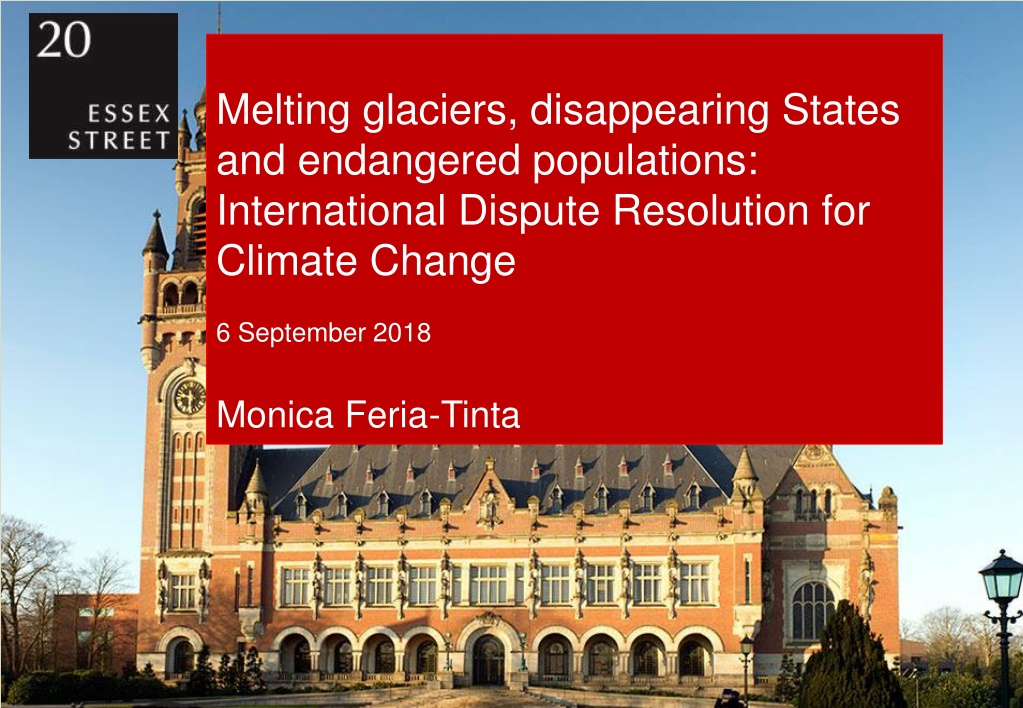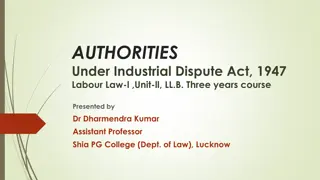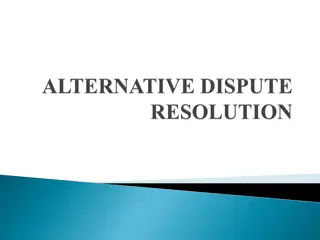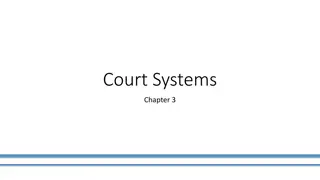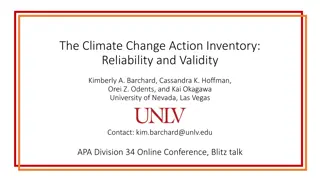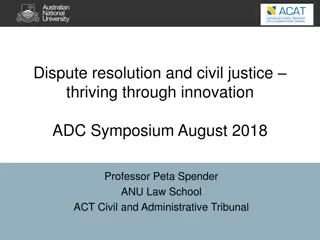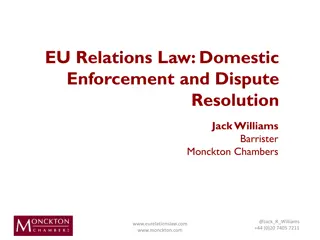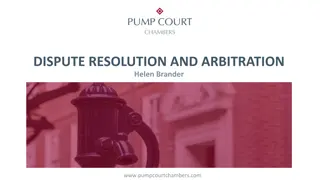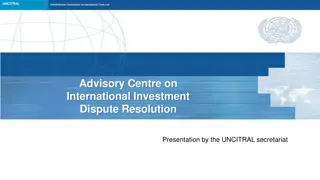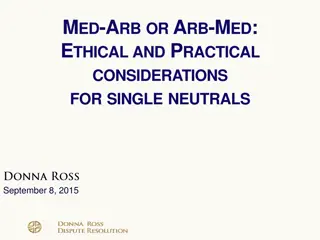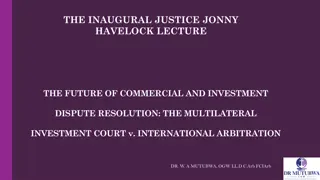International Dispute Resolution for Climate Change: Legal Cases and Actions
Explore how international legal institutions like the ICJ, Inter-American Commission on Human Rights, and regional human rights courts address climate change issues through cases like the Trail Smelter arbitration and actions against greenhouse gas emitters. Learn about the impact of global warming on indigenous communities and the environment, and the calls for mandatory measures to limit emissions and safeguard affected populations.
Download Presentation

Please find below an Image/Link to download the presentation.
The content on the website is provided AS IS for your information and personal use only. It may not be sold, licensed, or shared on other websites without obtaining consent from the author. Download presentation by click this link. If you encounter any issues during the download, it is possible that the publisher has removed the file from their server.
E N D
Presentation Transcript
mage result for ICJ pictures Melting glaciers, disappearing States and endangered populations: International Dispute Resolution for Climate Change 6 September 2018 Monica Feria-Tinta 1
Trail Smelter arbitration case (1941) the principle that polluter pays states have a duty to prevent transboundary harm 2
Takingclimate action to the court room Can the world s largest emitters of greenhouse gases be taken to account in international fora for the environmental damage these emissions are causing? Yes. It is my view that UN international human rights organs (i.e. UN Human Rights Committee), regional human rights courts, ITLOS (as ICJ), and arbitral tribunals are equipped to address issues of climate change. 3
The Inter-American System Sheila Watt-Cloutier et al v United States, Inter- American Commission on Human rights, 2005. Petition to the Inter-American Commission on Human Rights Seeking Relief from Violations Resulting from Global Warming Caused by Acts and Omissions of the United States 4
The Inter-American System Global warming refers to an average increase in the Earth s temperature, causing changes in climate that lead to a wide range of adverse impacts on plants, wildlife and humans. There is broad scientific consensus that global warming is caused by the increase in concentrations of greenhouse gases in the atmosphere as a result of human activity. The United States is, by any measure, the world s largest emitter of greenhouse gases, and thus bears the greatest responsibility amongst nations for causing global warming. Like many indigenous peoples, the Inuit, are the product of the physical environment in which they live. Nowhere on Earth has global warming had a more severe impact than the Artic. 5
The Inter-American System Adopt mandatory measures to limit its emissions of greenhouse gases and cooperate in efforts of the community of nations [ ] to limit such emissions at the global level. Establish and implement, in coordination with Petitioner and the affected Inuit, a plan to protect Inuit culture and resources, including inter alia, the land, water, snow, ice and plant and animal species used or occupied by the named individuals whose rights have been violated and other affected Inuit; and mitigate any harm to these resources caused by US greenhouse gas emissions Establish and implement in coordination with Petitioner and the affected Unit communities, a plan to provide assistance necessary for Inuit to adapt to the impacts of climate change that cannot be avoided. 6
The Inter-American System Artic Athabaskan Peoples v Canada, Inter-American Commission on Human Rights Petition to the Inter-American Commission on Human Rights Seeking Relief from Violations of the Rights of Artic Athabaskan Peoples Resulting from Rapid Artic Warming and Melting caused by Emissions of Black Carbon in Canada (filed in 2013) 7
The Inter-American System Advisory Opinion No 23 on Environment and Human Rights, Inter- American Court on Human Rights, 7 February 2018. Recognition of the Right to a Healthy Environment environmental degradation and the adverse effects of climate change affect the effective enjoyment of human rights ( 47). As regards transboundary harms, a person is under the jurisdiction of the State of origin if there is a causal relationship between the event that occurred in its territory and the affectation of the human rights of persons outside its territory. The exercise of jurisdiction arises when the State of origin exercises effective control over the activities carried out that caused the harmand consequent violation of human rights. Advisory Opinion, 104(h) 8
Saul Luciano Lliuya v RWE (Oberlandesgericht Hamm) The Peruvian farmer argues that RWE, one of the world s top emitters of climate-altering carbon dioxide, must share in the cost of protecting his hometown Huaraz from a swollen glacier lake at risk of overflowing from melting snow and ice. (Case filed in 2015) the fact that multiple parties have caused the interference ('disturbers') does not necessarily mean that eliminating that interference would be impossible. On the contrary, the established interpretation is that, in the case of multiple disturbers , each participant must eliminate its own contribution, (para 4). Whether the defendant s argument is true i.e., that there is no causal relationship between CO2 emissions and the increase in the water level in the lake -can be determined only on the basis of the evidence already taken. It is the Senate s opinion that the case is not ready for judgment without taking evidence as ordered, and therefore the defendant has not been subject to a violation of its constitutionally protected right to be heard in court or its right to effective legal protection. (Order of the Regional Court of Hamm, 1 February 2018, para 8), 9
International Court of Justice Advisory Opinion functions Article 96, paragraph 1, of the Charter of the United Nations [t]he General Assembly or the Security Council may request the International Court of Justice to give an advisory opinion on any legal question . Article 96, paragraph 2, of the Charter provides that [o]ther organs of the United Nations and specialized agencies, which may at any time be so authorized by the General Assembly, may also request advisory opinions of the Court on legal questions arising within the scope of their activities . 10
International Court of Justice Contentious jurisdiction 2 February 2018, the International Court of Justice ordered Nicaragua to pay compensation to Costa Rica for environmental damage in Certain Activities Carried Out by Nicaragua in the Border Area (Costa Rica v. Nicaragua) and Construction of a Road in Costa Rica along the San Juan River (Nicaragua v. Costa Rica), Judgment, I.C.J. Reports 2015 (II), pp. 740-741, its first ever order for compensation for environmental harm. 34. In cases of alleged environmental damage, particular issues may arise with respect to the existence of damage and causation. The damage may be due to several concurrent causes, or the state of science regarding the causal link between the wrongful act and the damage may be uncertain. These are difficulties that must be addressed as and when they arise in light of the facts of the case at hand and the evidence presented to the Court. Ultimately, it is for the Court to decide whether there is a sufficient causal nexus between the wrongful act and the injury suffered. 11
International Court of Justice 35. In respect of the valuation of damage, the Court recalls that the absence of adequate evidence as to the extent of material damage will not, in all situations, preclude an award of compensation for that damage. For example, in the Ahmadou Sadio Diallo case, the Court determined the amount of compensation due on the basis of equitable considerations (see Ahmadou Sadio Diallo (Republic of Guinea v. Democratic Republic of the Congo), Compensation, Judgment, I.C.J. Reports 2012 (I), p. 337, para. 33). A similar approach was adopted by the Tribunal in the Trail Smelter case, which, quoting the Supreme Court of the United States of America in Story Parchment Company v. Paterson Parchment Paper Company (1931, United States Reports, Vol. 282, p. 555), stated: Where the tort itself is of such a nature as to preclude the ascertainment of the amount of damages with certainty, it would be a perversion of fundamental principles of justice to deny all relief to the injured person, and thereby relieve the wrongdoer from making any amend for his acts. In such case, while the damages may not be determined by mere speculation or guess, it will be enough if the evidence show the extent of the damages as a matter of just and reasonable inference, although the result be only approximate. (Trail Smelter case (United States, Canada), 16 April 1938 and 11 March 1941, United Nations, Reports of International Arbitral Awards (RIAA), Vol. III, p. 1920.) 12
International Tribunal for the Law of the Sea Dispute Concerning Delimitation of the Maritime Boundary between Ghana and C te d Ivoire in the Atlantic Ocean (Ghana/C ted Ivoire) (Case 23) Order 25 April 2015 (Provisional Measures) 69. Considering that article 192 of the Convention imposes an obligation on States to protect and preserve the marine environment (see M/V Louisa (Saint Vincent and the Grenadines v. Kingdom of Spain), Provisional Measures, Order of 23 December 2010, ITLOS Reports 2008 2010, p. 58, at p. 70, para. 76); 70. Considering that article 193 of the Convention provides that States have the sovereign right to exploit their natural resources pursuant to their environmental policies and it also states that this right is to be exercised in accordance with their duty to protect and preserve the marine environment ; 13
International Tribunal for the Law of the Sea 71. Considering further that: [t]he existence of the general obligation of States to ensure that activities within their jurisdiction and control respect the environment of other States or of areas beyond national control is now part of the corpus of international law relating to the environment (Legality of the Threat or Use of Nuclear Weapons, Advisory Opinion, I.C.J. Reports 1996, p. 226, at pp. 241 242, para. 29); (a) Ghana shall take all necessary steps to ensure that no new drilling either by Ghana or under its control takes place in the disputed area as defined in paragraph 60; (b) [ ] (c) The Parties shall take all necessary steps to prevent serious harm to the marine environment, including the continental shelf and its superjacent waters, in the disputed area and shall cooperate to that end; [ ] 14
Thanks! MFeria-Tinta@20essexst.com London 20 Essex Street London WC2R 3AL Tel: +44 (0)20 7842 1200 Email: clerks@20essexst.com Singapore Maxwell Chambers #02-09 32 Maxwell Road Singapore 069115 Tel: +65 62257230 Email: clerks@20essexst.com 15
